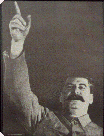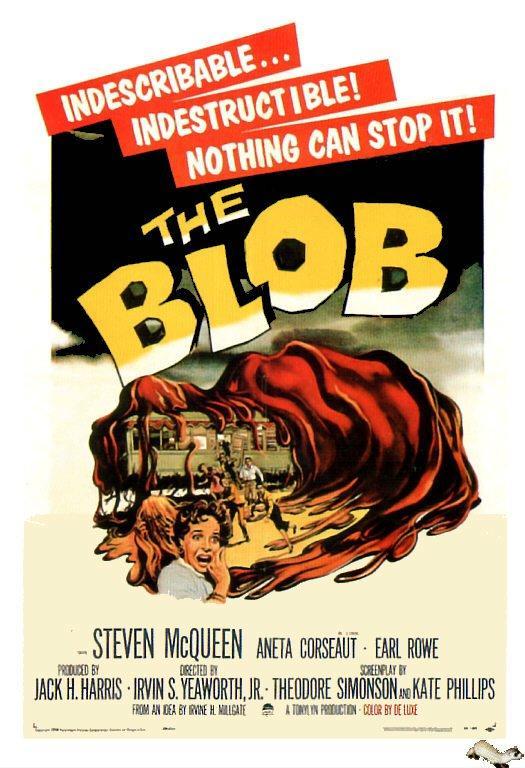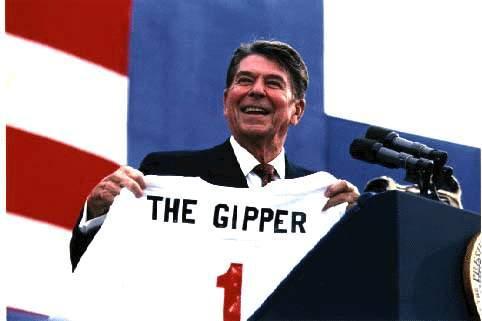Posted on July 17, 2004
Shots Were Fired
USSR didn't fall, it was knocked down
by
Daniel Clark
Since the death of former president Ronald Reagan, an old Cold War fallacy has been revived and repeated frequently. Ironically, this is a story that has been circulated by those on the political Right. In fact, it was even told by one of the leading Cold Warriors, Margaret Thatcher, during her videotaped eulogy at Reagan's funeral. This misperception -- that the war against Soviet aggression was won "without firing a shot" -- downplays the threat that global Communism posed in much the same way that the fallacies of the Left do.

While it's true that the Soviets bankrupted themselves trying to keep up with our military spending, and it's also true that they had no tactical response to Reagan's proposed Strategic Defense Initiative (SDI), the Cold War was not won entirely by economics and nuclear poker. Contrary to the popular catch phrase, shots were fired. They may not have been fired directly between the two superpowers, but the Soviet empire was nevertheless beaten, physically.
Reagan was routinely derided whenever he expressed his certainty that the free world would prevail over the Soviet Union. Although his critics proved to be wrong, their pessimism was far from unfounded. Considering America's historic unwillingness to stand up to the USSR, it's not surprising that so many people thought the latter to be the superior power.

Starting in the Second World War, and lasting all the way through the Carter years, Soviet expansion met only occasional and tentative resistance from the West. Roosevelt and Churchill, in a series of tragic negotiations with their accidental ally, allowed the Reds to devour the Baltic States (Lithuania, Latvia and Estonia), while also taking dictatorial power of East Germany, which it had instead agreed to administer in cooperation with the American, British and French-controlled sectors of that country.
After Nazi Germany fell, both FDR and Truman encouraged Josef Stalin to attack Imperial Japan, hoping that the Soviets would help bring about a speedy end to the war in the Pacific. Not until after the bombing of Hiroshima did they take the Americans up on this offer, managing to snatch Japanese-occupied territories in Manchuria and North Korea before the surrender. From these areas, the USSR later staged the Chinese Communist revolution, and instigated the Korean War.
The Soviet Union set up satellite Communist governments in Poland, Hungary, Romania, Bulgaria, Czechoslovakia and Albania, and then united them militarily under the Warsaw Pact. Those who tried to break free of this Soviet-dominated contrivance -- like Hungary in 1956 and Czechoslovakia in 1968 -- were mercilessly crushed, as the West looked on in self-inflicted paralysis. (Albania did succeed in severing itself from the pact in '68, but only by allying itself with China, which had severed its ties with the Soviets during Khrushchev's de-Stalinization period.)
When the U.S. did deploy troops to oppose Communist expansion in Vietnam, its leadership balked at any serious efforts to achieve victory, largely out of the fear of provoking a broader war with the Soviet Union and Red China. The sight of this reticence only emboldened the Soviets further. Throughout the Seventies, the expanding Communist blob extended its reach deep into Central America and Africa, using Cuba and Angola as conduits to provide arms and training to rebels in other countries.

It's easy to see from this how a Soviet victory in the Cold War was thought by many to be inevitable. Arguably, the West's greatest success to that point had been its ability to preserve South Korea, albeit in a perpetual state of declared war with the North.
This all changed in the Eighties. The Soviets suffered their own Vietnam in Afghanistan, and their own Bay of Pigs in Grenada. Keeping in mind the demoralization that resulted from America's Cold War setbacks, it's not hard to see how these subsequent Soviet failures reversed the psychology of the conflict. In previous decades, the Red Menace had sated itself by gobbling up many of the oldest, proudest nations in the world, with little fear of external resistance. How must it have recoiled, then, when America lashed out at it for filching so tiny a morsel as Grenada?
And yet, the significance of that skirmish was far greater than is generally acknowledged. In order to sell the invasion of the South Caribbean island to congressional Democrats, Reagan had characterized it as a mission to rescue American medical students, but that was only one facet of an operation that had far greater geopolitical repercussions.

By ejecting the Soviet-backed, Cuban-supported, illegitimate Marxist government from that island, Reagan not only took a Red pawn off the Cold War chessboard, but he thwarted the Soviets' next several moves. One of the factors that triggered the invasion was the fact that Cuban military engineers had been constructing an air base whose size indicated to American intelligence that it was meant for use by Soviet bombers. According to former assistant Secretary of State Otto Reich, the base was also planned as a refueling station for Cuban planeloads of soldiers and weapons bound for Africa.
Remember that Reagan had vigorously opposed the U.S. turnover of the Panama Canal out of a fear that it would be left vulnerable to a Soviet takeover. In his 1976 campaign speech, "To Restore America," the future president warned that Panamanian dictator Omar Torrijos was a pro-Communist ally of Fidel Castro, which he was. The Soviets had not become such a dominant force in the world by picking their targets at random. If not for the defeat of Nicaragua's Sandinista government, the FMLN rebels in El Salvador, and the People's Revolutionary Army in Grenada, then Cuba would have been but one among a ring of Communist bases surrounding the Caribbean. Consequently, the Soviet Union would have had realistic hopes of shutting off trade through the canal, with or without the cooperation of a sympathetic leader in Panama..
This grim scenario was averted through the use of military force -- by funding, arming and training indigenous anti-Communists when possible, and sending American soldiers into battle when necessary. It was not made possible by simply outspending the enemy. To the contrary, if no shots had been fired, it could have been the Soviet Union putting the economic squeeze on America, instead of the reverse.
Whereas events in Latin America amounted to a harsh tactical defeat for the Soviet Union at its extremities, the Red Army's own loss in Afghanistan dealt a devastating blow right to the Russian bear's solar plexus. If there's anything a brutal totalitarian government cannot afford, it is a show of weakness. Heavily armed with American Stinger missiles, the Afghans ousted the Soviets in 1989, after an extremely costly ten-year war. Not only did the beating cause dissension within the Soviet government, but it also encouraged the long-oppressed nations of Eastern Europe to break loose from its grip.
Later that same year, Hungary defied the USSR by opening its Western border with Austria. Poland rejected Communist rule and began implementing free-market reforms. The people of East Germany seized control of their government, tore down the Berlin Wall, and initiated the process of reunification with the West. The Soviet empire, which so shortly beforehand appeared that it might rule the world, was in ruins.

In 1987, when President Reagan stood at the Brandenburg Gate and said, "Mr. Gorbachev, tear down this wall," that was a demand, not a plea for mercy. The demolition of the wall two years later was not a gift from the Soviet premier, but the culmination of a series of bloody defeats for global Communism. If it were true that no shots had been fired, then Reagan's oft-quoted words would have been about as meaningless as if he'd recited a page from the Berlin phone book.
Once this is understood, Ronald Reagan's SDI strategy can be more fully appreciated. The Soviets' acquisition of atomic weapons had been the great equalizer. Reagan's proposal for a missile defense shield -- which Gorbachev believed we were capable of building, but knew that his country was not -- made the odds uneven again. A nullification of the nuclear threat would have meant that a military confrontation between the superpowers would have been fought with conventional weaponry. Soviet planes, ships and artillery were far inferior to ours, and they knew it. Now faced with a free world willing to fight back, they had no viable military options left.

The claim that the Cold War was won without firing a shot denies all this, and in doing so makes it easier for those on the Left to fall back on their revisionist fantasies that the Iron Curtain fell on its own, that the American military buildup of the Eighties was frivolous, and that ultimately, the Soviet Union did not threaten the United States. From there, they can conclude that the confrontation was largely a product of American paranoia, and that detente would likely have worked, if only it had been given a little more time.
The truth could not be more different. Shots were fired. American and allied soldiers died, as did innocent civilians in dozens of countries, on the four continents to which the Red Menace had spread. The words "Cold War" are not just a focus group-tested catch phrase. That series of events is called a war because it was one. It was not the Cold Dispute, the Cold Misunderstanding or the Cold Competing Narratives.
Thankfully, Ronald Reagan realized this, and ended the cringing, defeatist policies of the eight presidents who preceded him. When America went on the offensive, the tentacles of Communism were forced to withdraw. Because of this, the number of military and civilian casualties diminished, and finally disappeared with the implosion of the Soviet Union.
Today, we are engaged in another war, against another enemy bent on world domination. Again, we are fortunate to have a president who rejects the prevailing pessimism, but will we still have him six months from now? With a question like that hanging in the balance, we cannot afford to measure the success of the War on Terror by comparing it to a mythologized world war, that was somehow won without violence.
The Shinbone: The Frontier of the Free Press
Mailbag . Issue Index . Politimals